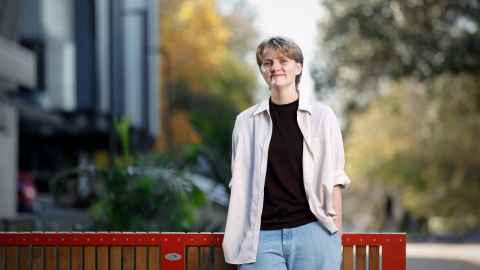Beck Nel
Beck is utilising a conjoint degree to study areas that interest them the most, with a keen direction to give back and provide for communities close to their heart.

Key facts:
Programme: Bachelor of Arts, majoring in Criminology and Gender Studies / Bachelor of Science conjoint, majoring in Psychology
High school: Pakuranga College
“I originally started off as a Bachelor of Arts (BA) student majoring in Psychology and Criminology, only adding my Gender Studies major in my second year. It came after I took GENDER101 as a general education course, and I realised how deeply passionate I am about the subject. I had also inadvertently ended up writing about gender in a lot of my other coursework, and I was keen to strengthen my knowledge. I find all three of my subjects incredibly interesting and I knew I wanted to pursue them all equally, and doing a conjoint facilitated that.
“I chose to move my Psychology major over to a Bachelor of Science (BSc) [from a Bachelor of Arts], and it was arguably one of the best decisions I’ve made since my enrolment. Having experience with mental health challenges, and knowing firsthand how valuable early intervention can be, the idea of contributing to this space was meaningful to me.
“My conjoint degree gives me the opportunity to develop in areas I was already interested in and gave me the flexibility to explore areas with which I was unfamiliar. I’ve been able to study things I knew I would like, such as developmental psychology, and things that just caught my eye, such as theology. It’s given me a much wider perspective on social issues, which has been invaluable.
“I love how wide-ranging and intersecting all my subjects are. I’ve been able to apply knowledge from my classes to one another, which has meant that my arguments and understandings are strong and have inter-disciplinary research to back them up.
My degree sets the scene for my future – I like that it doesn’t lock me into one career path, but rather it opens doors to many different options. My BA has been the irreplaceable first step in what I hope will be a fulfilling career.
“My favourite module has definitely been Arts Scholars – I couldn’t recommend it enough. It gives you the opportunity to practice your research skills beyond what is offered in undergraduate courses. I met my best friends through Arts Scholars, and I’ve made several academic connections that have proved incredibly useful. Getting to collaborate and discuss with students and other faculties has provided me with insight that I otherwise would not have.
“It seems like every day there’s another news article reporting something that sounds almost dystopian. My BA helps me to approach current events with a level of critical thinking and provides the tools to analyse situations, making me a lot more confident in my stances on divisive topics.
“Personally, I found the step up in workload from high school to be a good thing. University essentially becomes your full-time job, which can be daunting when you’re working alongside your study. I find that my programme has a lot of resources that can help to equip you for this challenge, so even though it’s tough at times, it's worth it.
“I’m a member of the Arts and Education Students Association (AESA), the Queer Students Association (QSA), the Psychology Students Association (AUPSA), UOA Criminology Club, and Thursdays in Black. Each of these clubs provides a community for students of various demographics. They also facilitate a lot of cool events and projects that you can get involved in! QSA, for example, has a community pantry, a transition fund and regularly hosts events. These are super cool ways to do good for your community while having a load of fun.
“I want to use my BA/BSc to continue into postgraduate study in Psychology, so that I’ll eventually be able to register as a practicing psychologist. My degree has also provided me with countless connections and skills that will be useful for years to come.
“I’m hoping to work as a forensic psychologist, potentially working with kids! I’ve developed a real love for forensic psychology, and there is always a shortage of them. I’ve worked with kids since my first year, and I’ve found it really rewarding to see the progress that kids can make when provided with the right support.”